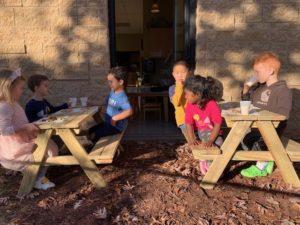
The traditional classroom experience includes indoor learning, but there are many Montessori schools that offer an outdoor classroom setting. An outdoor classroom expands beyond the typical outdoor time found during recess or gym. True classroom time is dedicated to the outdoors, and students can gain a lot of knowledge from the experience.
Learn about the advantages of an outdoor classroom and the skills your child will learn through an outdoor setting based at a Montessori school.
1. Learn Gardening Skills
An outdoor classroom gives students a chance to really expand on their motor skills. One of the main ways is through gardening. Montessori schools with community gardens give students a chance to use shovels, wheelbarrows, hoes, and other garden tools. The grips, strength, and specific tasks will help expand on the motor skills.
Gross motor skill development will include maintaining balance while pushing a wheelbarrow. Fine motor skill development could include pulling out weeds or trimming flowers. The foundation of gardening also includes a lot of independent skills a child will learn and use as they grow older.
Instead of being handed a carrot on a plate, a child will learn the time and effort it takes to grow a carrot and feel more pride when plants grow and are harvested. Children can find a lot of satisfaction through the work put into the garden.
2. Learn School Subjects Outdoors
A Montessori outdoor classroom keeps the learning out of books and focuses more on learning through activities and experiences. An outdoor classroom finds several suitable replacements for traditional learning subjects. A teacher may use history lessons to explain the age of trees, the land use, and the geography of the area.
Many forms of math are explored through counting, splitting up objects, and measuring the sizes of plants, rocks, and animals. Science becomes a huge part of outdoor learning as children learn to identify animals, like birds, or various species of trees. The annual cycle of trees can be visualized and explored with examples right in the outdoor classroom.
The more your child spends outdoors, the more their skills will grow in these areas. As a child uses outdoor learning, the skills will come naturally when they spend time outdoors at their own home.
3. Free Exploration
Instead of forcing children to learn through an overly structured environment, a Montessori classroom emphasizes free exploration, and an outdoor classroom offers even more free exploration than an indoor class. Children can choose their own activities and play in different areas.
For example, small play areas and themed clubhouses give a child a chance to create their own imaginative worlds. Children have a chance to expand their creative mind while adding layers of learning to the mix. The free exploration gives a child a chance to find their strengths and interests, which will allow them to branch out and build on various skills.
The free exploration also gives a child ways to expand on their social skills. Children will interact with other students and learn how to problem solve.
4. Outdoor Advantages
Extended time outdoors comes with many advantages over an indoor setting. Breathing in fresh air can give children more focus and energy to complete tasks. The natural light from the sun will put children in a better mood and also helps increase levels of vitamin D.
In our current times, fresh circulated air will also help reduce the transmission of diseases like the flu or COVID-19. Children are less likely to spread germs and can have more physical space in an outdoor setting that is larger and more open than a classroom.
For more information on our outdoor classrooms, contact us at Miniapple International Montessori School. We have multiple levels of learning and can provide a safe outdoor experience for the little student in your life.

